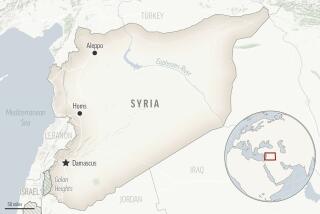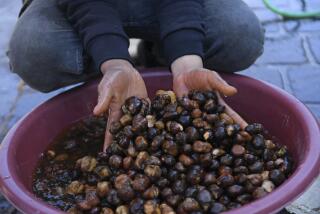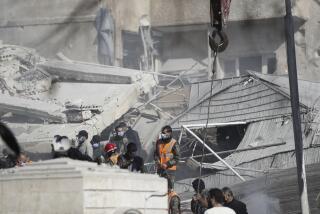Syrian activists say government attacked civilians fleeing town
Civilians fleeing a besieged town near Syria’s capital were attacked by government forces early Wednesday, leaving many dead and others wounded, activists and residents said.
Activists in Muadhamiya had struck a deal with the Syrian government, with the help of humanitarian organizations and individuals, to allow up to 2,000 civilians to leave the town. But as the women, children and elderly walked toward buses near the town’s western entrance, they came under mortar attack from the government’s nearby 4th Armored Division, activists said.
At least 40 people were injured, but the dead have yet to be tallied because of the difficulty reaching the bodies, said Qusai Zakarya, a resident and activist in the town.
The opposition Syrian Observatory for Human Rights charged that government troops used civilians as human shields to advance into the town, which they have been trying to seize for more than a year.
The opposition-held town has been under government blockade for 11 months, resulting in a severe food and medicine shortage. Activists say 11 women and children have died of starvation so far.
On Saturday and Sunday, more than 1,500 women, children and elderly reportedly fled the town.
At least 9,000 civilians remain trapped there, said Ahmad Moadamani, another resident.
The deal was struck with the help of the Red Crescent and Mother Agnes Mariam of the Cross, a Carmelite nun who also goes by her birth name, Fadia Laham. She has gained attention recently for publicly backing the government of President Bashar Assad and denying that a chemical weapons attack occurred. Muadhamiya was one of the towns struck by chemical weapons Aug. 21.
Some of those who left the town over the weekend and arrived in a Damascus neighborhood, including almost a dozen children, have been interrogated about rebel positions in the town and the names of activists, Zakarya said.
Many towns and neighborhoods are in a similarly dire situation, having been cut off from food and aid for months. They include other suburbs and neighborhoods of Damascus and parts of Homs.
On Oct. 2, the U.N. Security Council, concerned by what it called a deepening humanitarian tragedy, urged the Syrian government to allow immediate and unhindered delivery of humanitarian aid across the country. No changes resulted.
This week, Doctors Without Borders called for a massive political mobilization to push for humanitarian access, similar to the urgency given an agreement on disarming Syria of its chemical weapons.
“Syrian people are now presented with the absurd situation of chemical weapons inspectors driving freely through areas in desperate need, while ambulances and food and drug supplies organized by humanitarian organizations are blocked,” said the group’s general director, Christopher Stokes.
In response to the worsening food situation in many parts of Syria, Muslim clerics in the country this week issued a fatwa, or religious order, allowing those facing starvation to eat cats and dogs. The animals are rarely kept as pets in the country, but many towns and cities have a large stray population.
Zakarya wasn’t sure if residents would follow the religious ruling, viewing it as a further debasement.
“For 11 months we have been under siege; the only thing that comes into the town is shells and the only thing that leaves is the souls of those killed,” he said. “Is it possible that the United Nations and the entire world community haven’t been able to bring in some flour and medicine?”
ALSO:
Pakistani official, seven others, killed by suicide bomber
Political gridlock over U.S. debt not just America’s problem
The worst good news possible: Mexico gets World Cup lift from U.S.
More to Read
Start your day right
Sign up for Essential California for news, features and recommendations from the L.A. Times and beyond in your inbox six days a week.
You may occasionally receive promotional content from the Los Angeles Times.







